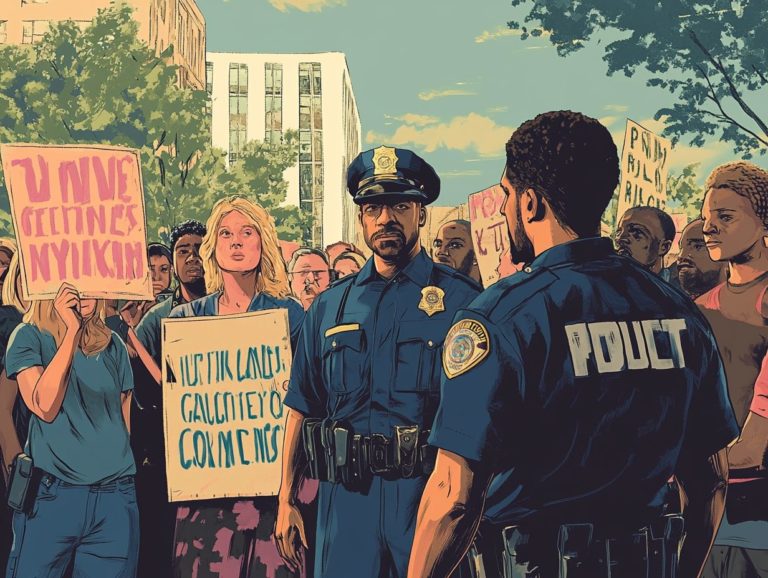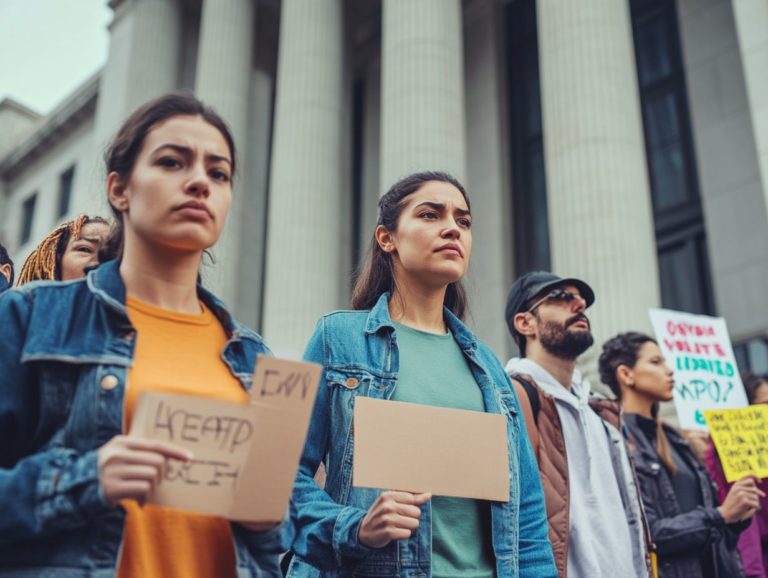5 Essential Resources for Understanding Your Rights
Navigating the complexities of legal rights can often feel overwhelming, but knowing where to find reliable information is crucial for you.
This article delves into five essential resources designed to help you know your rights as a citizen. From government websites and legal aid organizations to non-profit groups and online communities, each resource provides unique support and insights tailored to your needs.
Whether you re grappling with a legal issue or simply aiming to stay informed, these tools can truly make a difference. Access this invaluable information to enhance your understanding of your rights and empower yourself.
Contents
- Key Takeaways:
- 1. Government Websites
- 2. Legal Aid Organizations
- 3. Non-Profit Organizations
- 4. Online Forums and Communities
- 5. Legal Blogs and Websites
- What Are Your Basic Rights as a Citizen?
- How Can You Access Government Websites for Legal Information?
- What Services Do Legal Aid Organizations Provide?
- How Can Non-Profit Organizations Help with Understanding Your Rights?
- What Are the Benefits of Participating in Online Forums and Communities?
- How Can Legal Blogs and Websites Provide Valuable Information?
Key Takeaways:
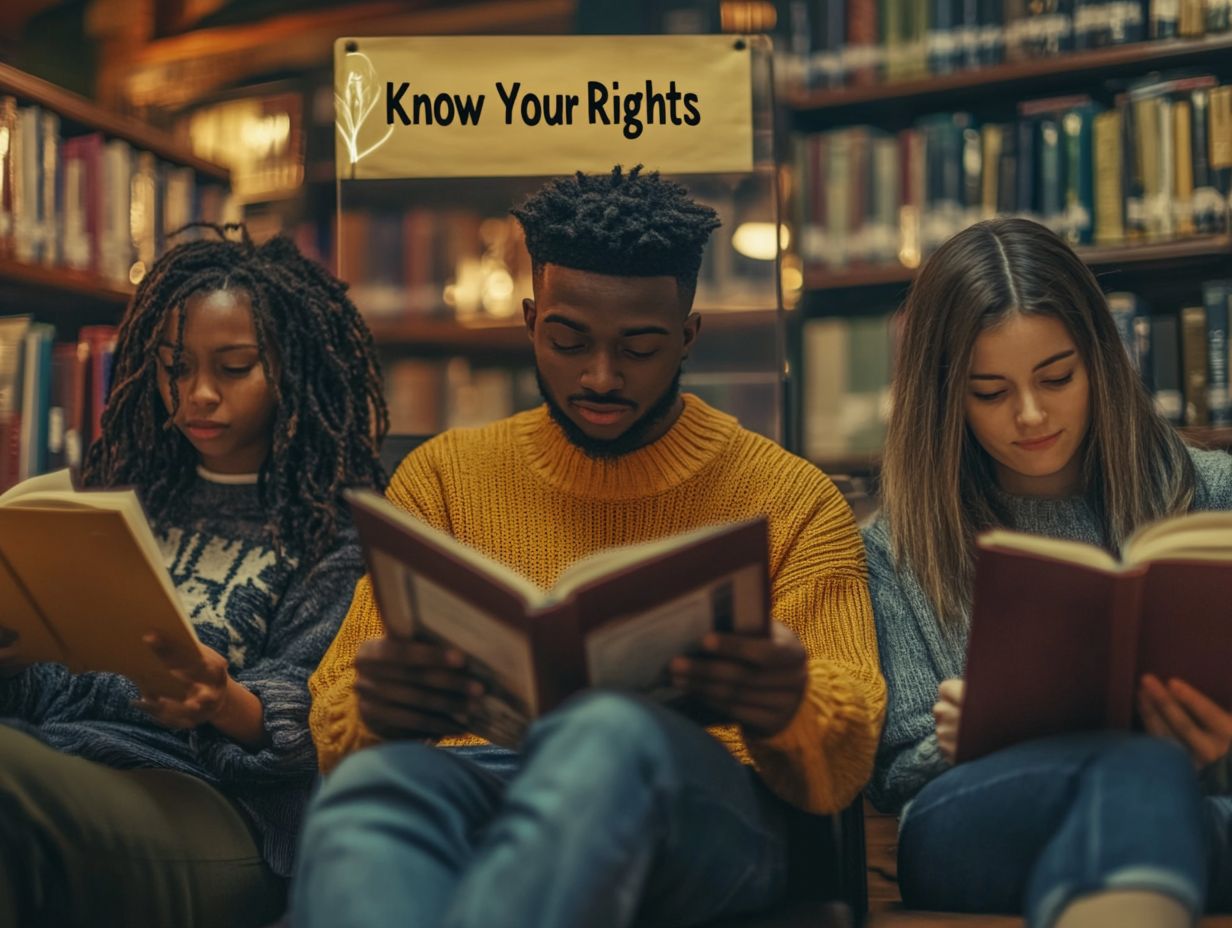
Visit government websites to learn about your rights.
Legal aid organizations provide essential services to help you with legal questions.
Non-profit organizations can assist you in understanding and exercising your rights.
1. Government Websites
Government websites are invaluable resources for understanding your rights as a citizen. They provide access to vital information on human rights, civil rights (which protect individuals from discrimination), voting rights, and the protections offered under the U.S. Constitution.
This information safeguards against discrimination and ensures equality for everyone, including the LGBTQ community, public students, and marginalized groups. You’ll find relevant laws, such as the Voting Rights Act and the Fourth Amendment, which form the backbone of the legal framework enforced by law enforcement.
Platforms like USA.gov and the U.S. Department of Justice provide comprehensive guides that illuminate various civil liberties, including your right to protest and the significance of due process.
If you re looking to report discrimination, the Equal Employment Opportunity Commission (EEOC) website is essential. These rights aren’t just theoretical; they re enforced in federal courts, where landmark cases set precedents that shape how laws are applied.
The Americans with Disabilities Act (ADA) stands as a testament to the protections available for individuals with disabilities, showcasing the importance of legal avenues through which you can advocate for your rights.
2. Legal Aid Organizations
Legal aid organizations are here to support you when you face legal challenges. They ensure that human rights are upheld and that you have access to essential legal resources while navigating the complexities of law enforcement and the justice system.
Prominent groups like the ACLU and NAACP lead the charge in protecting civil rights across diverse demographics. These organizations offer an array of services, including legal representation in court, where skilled attorneys advocate on your behalf especially crucial when you can t afford private counsel.
They provide vital education about your rights, enabling you with knowledge regarding your legal standing and the resources at your disposal. Advocacy is another key element; these organizations tirelessly work to influence policy changes, tackle systemic injustices, and promote the economic, social, and political rights of marginalized communities.
Their ultimate goal is to create a more equitable society for everyone, including you. Don t wait! Access these vital resources today.
3. Non-Profit Organizations
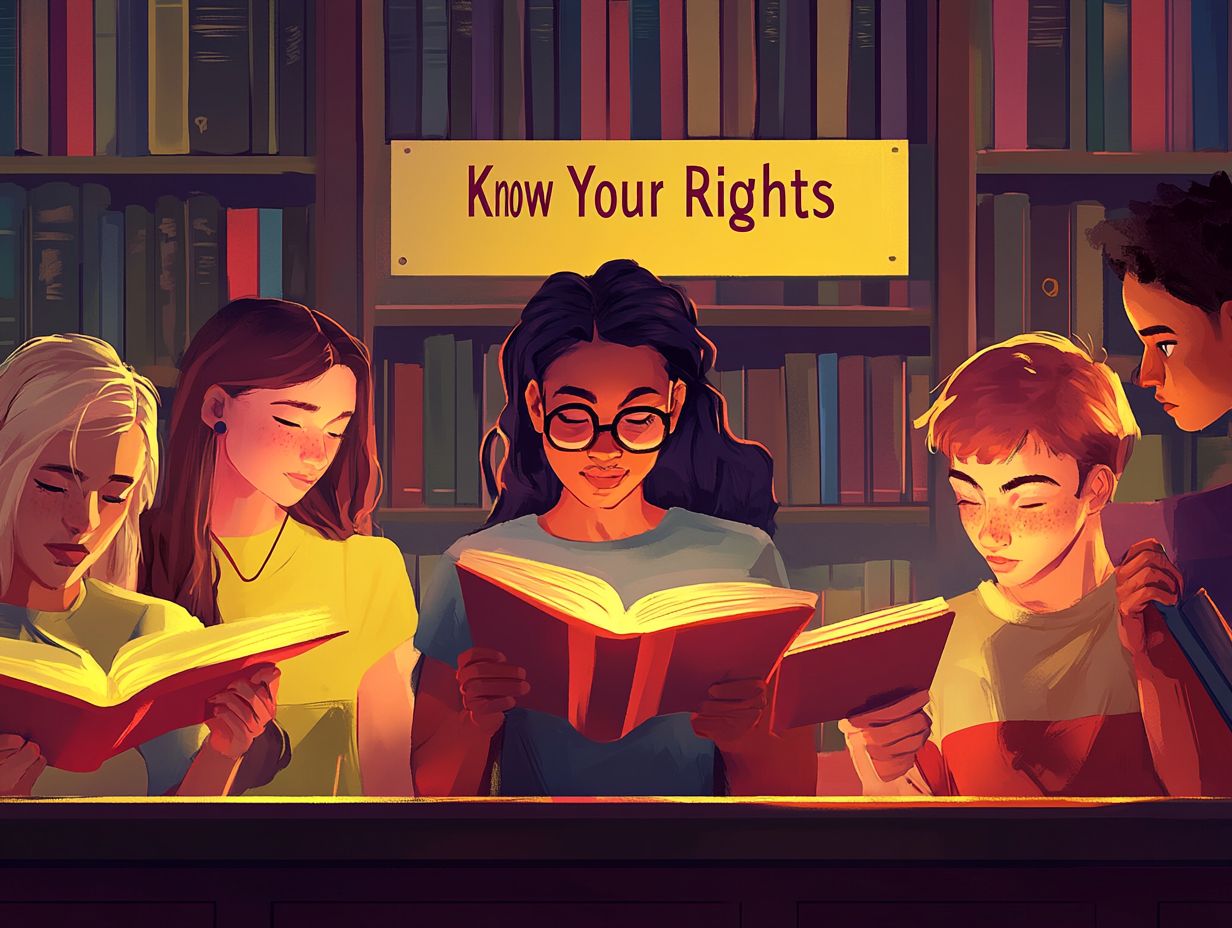
Non-profit organizations are dedicated to advocating for various human rights issues, concentrating on vital areas such as LGBTQ rights, reproductive laws, and access to education and healthcare. They work tirelessly to promote equality and raise awareness about the challenges faced by vulnerable populations.
These organizations serve as essential resources within their communities, providing educational materials that help individuals understand their rights. They engage in grassroots advocacy and offer supportive services, including counseling, legal aid, and workshops, all designed to empower citizens.
In the realm of reproductive rights, for example, certain nonprofits collaborate with health professionals to develop campaigns that inform individuals about safe practices and legal options. Similarly, groups focused on LGBTQ rights often host events that foster community bonding and resource sharing, ensuring that those who identify as part of the community feel supported and well-informed about their rights and the services available to them.
4. Online Forums and Communities
Online forums and communities offer you a valuable platform to share experiences, seek advice, and engage in discussions surrounding human rights. Here, you can gain insights into critical topics such as discrimination, voting rights, and the rights of the LGBTQ community. This fosters a sense of solidarity and mutual support among members.
These platforms encourage open dialogue and serve as valuable knowledge sources, granting you access to resources that range from legal documents to expert opinions.
Being part of such a community brings unique advantages. Shared experiences often lead to a deeper understanding of individual rights and the complex legal protections at your disposal.
This collaborative environment enables you to advocate for yourself and others, creating a ripple effect that enhances awareness and mobilizes action around pressing issues. By learning from one another, you can cultivate a more nuanced perspective on your rights while collectively striving for a more equitable society.
5. Legal Blogs and Websites
Legal blogs and websites present a treasure trove of information on human rights issues, carefully explaining complex legal matters tied to the U.S. Constitution, discrimination, education rights, and voting rights.
This enables you with the knowledge needed to understand your rights and the legal framework intended to protect them. These platforms are invaluable resources, catering not only to legal professionals but also to individuals like you who seek clarity on your entitlements.
They frequently feature articles on recent legislative updates, landmark court cases, and practical advice concerning issues such as tenant rights or workplace discrimination. By offering insights into these vital topics, these sites ensure that you stay informed about ongoing changes in laws and protections that may affect your life.
Staying aware not only enhances your personal advocacy but also fosters community engagement around critical legal issues that matter to you.
What Are Your Basic Rights as a Citizen?
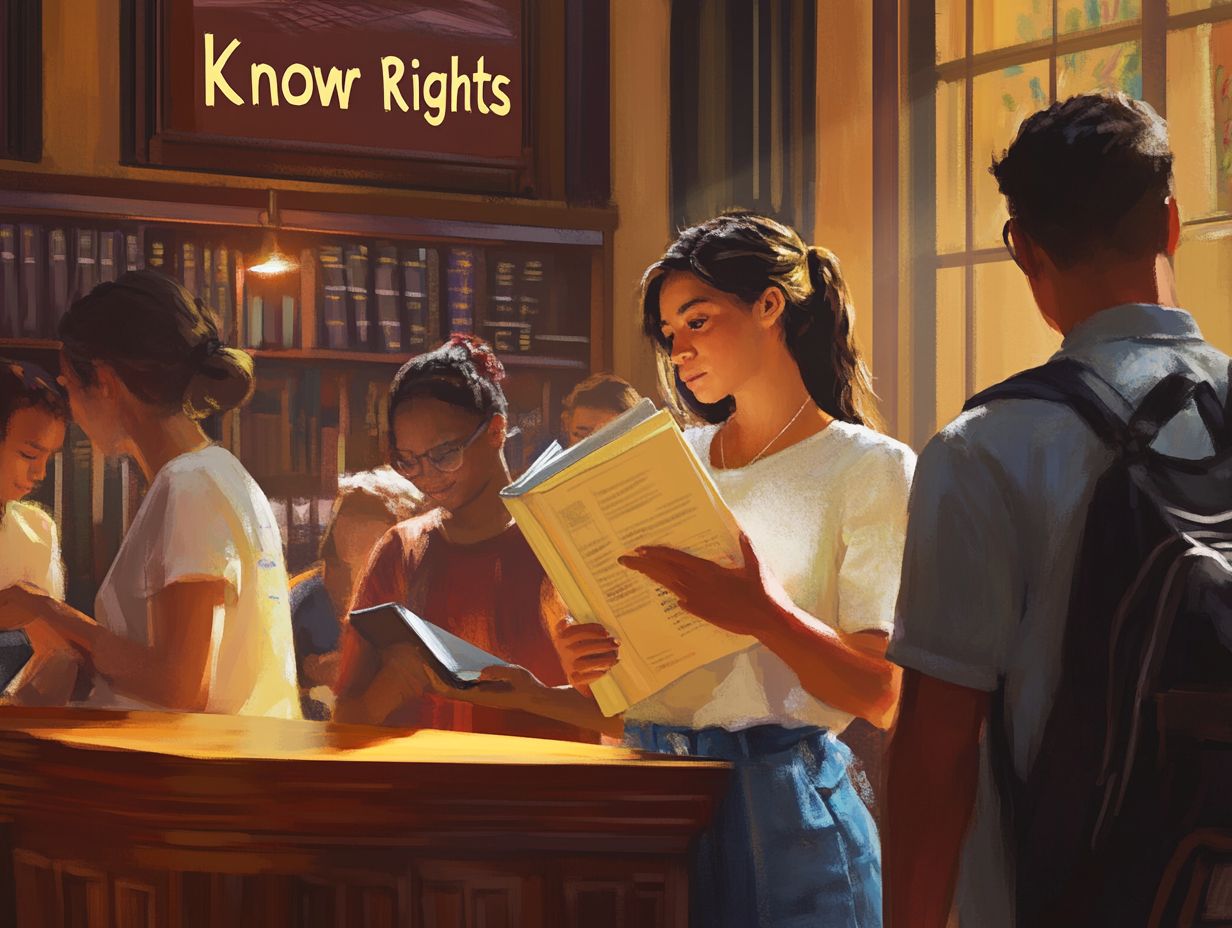
As a citizen, knowing your fundamental rights is crucial! These rights are protected by the U.S. Constitution and various civil rights laws. They include the right to vote, the right to equality regardless of race, gender, or sexual orientation, and rights related to economic, social, and healthcare access.
All of these are designed to protect you against discrimination and foster a society grounded in justice and fairness. These rights also embrace your freedoms of speech, assembly, and religion, enabling you to express your beliefs and opinions without the fear of retribution.
International human rights treaties further strengthen these protections, affirming your universal right to life, liberty, and personal security. This creates a framework within which you can challenge injustices.
In your daily life, grasping these rights is crucial. You can assert them by participating in civic duties, engaging in peaceful protests, or seeking legal remedies when your rights are violated. Stay informed and get involved today to protect your rights!
How Can You Access Government Websites for Legal Information?
Accessing government websites for legal information is a seamless process, allowing you to explore your rights and responsibilities on crucial issues such as human rights, civil rights, the U.S. Constitution, voting rights, and protections against discrimination.
By effectively navigating these sites, you can advocate for yourself in various situations, ensuring you re well-informed about the legal protections at your disposal.
To get started, use a trusted search engine to locate the official website of your local, state, or federal government. Usually, the homepage will feature clearly labeled sections that guide you to topics like legal aid, public services, and citizen rights.
Take the time to delve into the FAQs or Resources sections, as they often hold valuable insights. Familiarize yourself with the site s search function to quickly locate specific laws or regulations. Understanding how to navigate these resources is essential, enabling you to assert your rights with confidence.
What Services Do Legal Aid Organizations Provide?
Legal aid organizations offer a wealth of essential services tailored to your needs. These include legal representation, advocacy for human rights, assistance for victims of discrimination, and education about civil rights.
These organizations help you understand the complicated legal system, with valuable support from groups like the ACLU and NAACP.
In addition to these vital functions, many legal aid entities engage in pro bono work. They provide free legal assistance to those who may struggle to afford representation.
This help can be a lifeline for housing, family law, and immigration issues, ensuring you have access to the support you need.
These organizations also run educational outreach initiatives. They empower you by equipping you with knowledge about your rights, providing resources that foster a sense of agency and confidence.
Community support programs are also instrumental, assisting you in rebuilding your life and promoting resilience within your community.
Together, these services champion equality and justice. They significantly impact marginalized populations by ensuring their voices are heard and represented. This collective effort strengthens the foundation of a more equitable society, paving the way for a brighter future.
How Can Non-Profit Organizations Help with Understanding Your Rights?
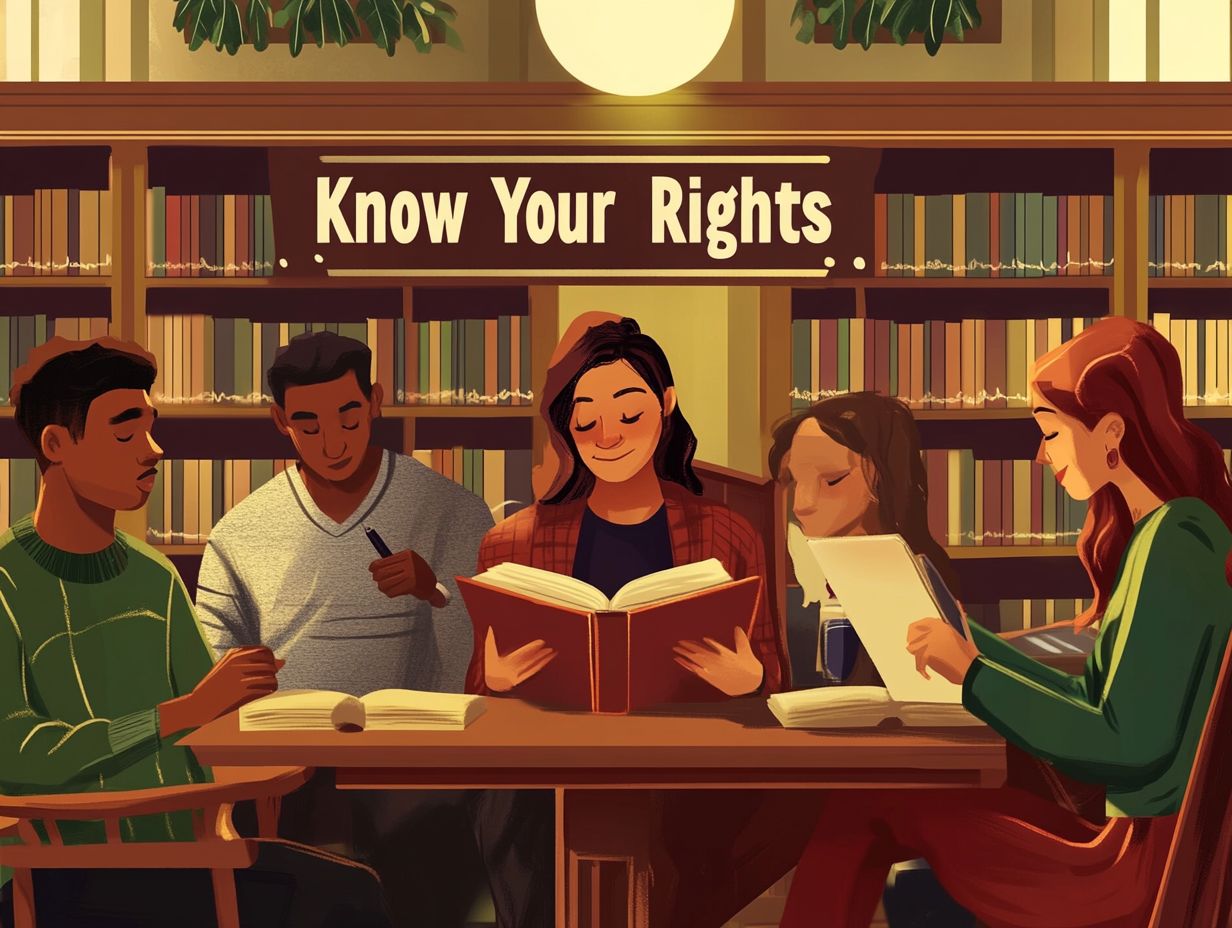
Non-profit organizations play a crucial role in helping you understand your rights, offering valuable resources and advocacy on issues like human rights, LGBTQ community matters, education rights, healthcare access, and protection against discrimination.
Through a range of workshops, customized educational materials, and easily accessible online resources, these organizations aim to enable you with the knowledge needed to navigate complex systems.
For example, many non-profits implement specialized programs designed to raise awareness about the legal protections available to marginalized groups. These initiatives specifically focus on youth within the LGBTQ community.
Campaigns such as Know Your Rights not only enhance your understanding but also cultivate a sense of community enablement. They motivate you to advocate for yourself and others when facing injustice.
What Are the Benefits of Participating in Online Forums and Communities?
Participating in online forums and communities presents you with a wealth of benefits, including access to vital support networks, shared insights on human rights issues, and opportunities to collectively advocate for equality and tackle discrimination.
Engaging with these platforms nurtures a sense of community, allowing you to connect with like-minded individuals who resonate with your values and experiences. This connection fosters camaraderie and amplifies voices that might otherwise remain unheard.
These networks often prove to be invaluable resources, equipping you with effective strategies for activism while keeping you informed about critical developments in human rights.
By collaborating with others, you can deepen your understanding, embrace diverse perspectives, and feel enabled in your endeavors all while contributing to a larger movement committed to advancing social justice and equality.
How Can Legal Blogs and Websites Provide Valuable Information?
Legal blogs and websites stand as invaluable resources for you, offering insights into human rights, civil rights, and the U.S. Constitution. They are essential for keeping you updated!
These platforms showcase a diverse range of content:
- Articles that simplify complex legal jargon into easily digestible language.
- Case studies that demonstrate real-world applications of the law.
- Expert commentary that sheds light on current legal issues.
By immersing yourself in this wealth of information, you can deepen your understanding of complex legal issues. This makes it easier for you to advocate for your rights and identify injustices.
Regular updates and engaging discussions cultivate a more informed society. You can navigate the legal landscape with greater confidence.
Frequently Asked Questions
What are the 5 essential resources for understanding your rights?
The 5 essential resources are government websites, groups that help you with legal problems, community organizations, law libraries, and online legal resources.
How can government websites help me understand my rights?
Government websites, such as those run by the U.S. government or your state government, provide valuable information about laws and regulations. They also offer resources for finding legal assistance.
What services do legal aid organizations offer?
Legal aid organizations provide free or low-cost legal services to individuals who cannot afford a private attorney. They help you understand your rights and provide legal representation if needed.
What types of information can I find at a law library?
Law libraries have a wide range of legal resources, including books, articles, and databases. You can research your rights and understand legal terms and processes there.
How can community organizations help me understand my rights?
Community organizations, such as civil rights groups or advocacy groups, provide education and support for individuals seeking to understand their rights. They may offer workshops or resources.
Are online legal resources reliable for understanding my rights?
Yes, online legal resources can be valuable. However, it’s important to use reputable sources and double-check information with official websites or legal professionals.
Don t wait! Empower yourself with knowledge today!




